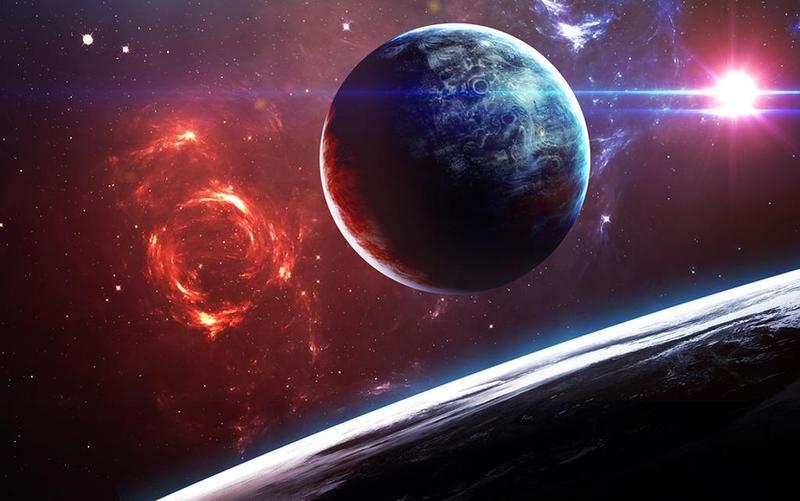Space Exploration Helps Us Explore Our Gods and Ourselves
Space Exploration Helps Us Explore Our Gods and Ourselves
Our deities make the world go round. They also make us go round the worlds in outer space. In one way or another, such exploration is bound up with our quest for deification.
Space exploration tells us a lot about our deities. It also tells us a lot about ourselves. Augustine and Feuerbach wrote of how we often pay homage to gods we image, or that image us. Sometimes, to reference Feuerbach, they are one and the same. Here is what Mary-Jane Rubenstein writes on the subject of worship and the close connection between our conceptions of divine and human sovereignty:
If, as thinkers as varied as Augustine and Ludwig Feuerbach have argued, there is a reciprocal relationship between human beings and their visions of the divine—if, to put it crudely, people worship gods who look like them—then the Atomists’ refusal of divine sovereignty should have profound consequences for human sovereignty as well.
This doctrine’s import was not lost on Alexander the Great. He was filled with grief over the Atomist teaching that there is an infinity of worlds: “Is it not worthy of tears that, when there are infinitely many kosmoi, we are not yet masters of one?”
The aim of the Atomist teaching was to combat the notion of divine hegemony and, it would seem, the human drive to conquer everything.
What kinds of deities do we worship? Those that subdue and abuse all that come across their path, or those that steward life and foster it so that it might flourish? Like fathers, like sons. Like deities, like humans.
In light of the preceding discussion, it is worth noting that we have named all the planets except Earth after Greek or Roman deities. Take note of the following:
All of the planets, except for Earth, were named after Greek and Roman gods and godesses. Jupiter, Saturn, Mars, Venus and Mercury were given their names thousands of years ago. The other planets were not discovered until much later, after telescopes were invented. The tradition of naming the planets after Greek and Roman gods and goddesses was carried on for the other planets discovered as well. Mercury was named after the Roman god of travel. Venus was named after the Roman goddess of love and beauty. Mars was the Roman god of War. Jupiter was the king of the Roman gods, and Saturn was the Roman god of agriculture. Uranus was named after an ancient Greek king of the gods. Neptune was the Roman god of the Sea. Pluto, which is now classified as a dwarf planet, was the Roman god of the underworld. The name Earth is an English/German name which simply means the ground.
As noted above, we have named the “red planet” after the Greek God of war, Ares, whose Roman name was Mars. Its reddish color is said to resemble blood, which is appropriate for the war god. How interesting. Will we wage war on that or other planets, if we find life there, just as we have done on Earth? If so, perhaps we should reframe the Lord’s Prayer to read, “Our fathers who art in the heavenlies, hallowed be your names. Your kingdoms come, your wills be done on Mars, as they are on Earth….”
If, however, we would stick to the ancient biblical script, we had better account for Jesus’ own way of promoting human and cosmic flourishing. From his vantage point, having his Father’s will as foremost in our thoughts and passions leads us not to take matters into our own hands. Rather, it leads us to submit our wills to Jesus’ Father. Jesus’ Father leads Jesus to live humbly and sacrificially, not with domineering hubris that wages war on others and colonizes them—as un-Christ-like Christendom so often has done.
If only we could get our own house or world in order so that we don’t wreak havoc elsewhere. What will that take? Divinization not according to Alexander the Great or Christendom, but according to Jesus.
Now, if we really want to be divinized in the classic Christian sense, not of becoming gods by nature, but by participating in the divine nature through grace, we must trace the steps of Jesus. After all, “He became what we are so that we might become what he is.” And what did the Lord become? A servant. The divine Word demonstrated his sovereignty in humble service.
As stated at the outset of this piece, space exploration tells us a lot about our deities and ourselves. As we explore, may we discover the drives that propel us into orbit. Hopefully, they are drives that help life here on Earth and possible life on other planets flourish rather than perish for our sake.
by Paul Louis Metzger For Patheos
Be the first to post a message!
